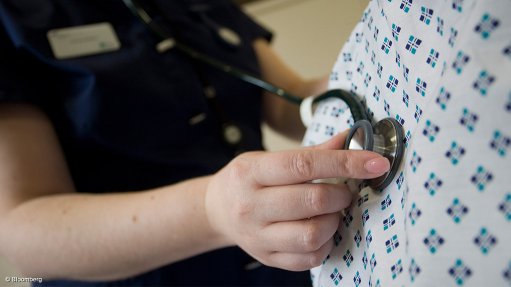
Photo by: Bloomberg
This morning (Thursday) hundreds of frontline health workers, health service managers and policy makers in different parts of South Africa observed a minute’s silence with Health Minister Dr Zweli Mkhize and several MECs for Health in memory of their colleagues and patients who had lost their lives to the COVID-19 pandemic.
This rare moment for sharing their loss came at the opening of a webinar to mark World Patient Safety Day, an annual event instituted in 2019 by the World Health Organization to raise awareness of the unintended harm to patients that occurs during the course of health care.
The slogan for this year’s World Patient Safety Day is “Safe health workers, safe patients” and it draws attention to the fact that health worker safety is a prerequisite for patient safety. Presenters referred extensively to the safety challenges posed by the COVID-19 crisis and the lessons learnt.
Minister Mkhize headed up the panel of speakers and highlighted the many facets of risk to health workers during the past months.
“Perhaps it is not widely appreciated that the health workers not only took on board a significant risk to themselves but also increased the infection risk to their families. For months our health workers have waged an exhausting battle to do their utmost for their patients, to preserve their own physical and mental strength, and to keep their family members safe,” he said.
The Minister said a total of 32 429 health workers had contracted the coronavirus as of 11 September and 257 had succumbed to the virus.
Dr Mkhize urged health service managers and health workers to create active, competent occupational health and safety committees at institutions across the country. He said talks with unions in recent days had highlighted issues that “need to be looked at more sensitively” and said he welcomed better communication with unions in order “to shine light on some of our blind spots – because the overarching interest of all of us is the safety of workers”.
Mr Daniel Manamela, Deputy General Secretary of the Democratic Nursing Organisation of SA (Denosa) endorsed the Minister’s call for empowered occupational health and safety committees, stressing the need for strong participation of elected worker representatives.
Other panel members welcomed the commitment of the Department to improving health worker and patient safety. Dr Owen Kaluwa, World Health Organization Country Representative in South Africa, gave the assurance that his organisation would stand shoulder-to-shoulder with South Africa in this effort.
Dr Caroline Lee of the Healthcare Workers Care Network emphasised that there was much work to be done in creating secure working environments for health workers.
She described the immense struggle health workers waged at the height of the lockdown just to ensure their children were cared for, get transport to work and find time to buy household necessities.
Much psychological stress experienced by health workers was because they mistrusted the infection prevention and control measures in their workplaces, the personal protective equipment they were given and their own ability to use PPE properly, said Dr Lee. She cited research showing how psychological stress impacted on patient care and its personal consequences for workers themselves, ranging from increased car accidents, relationship breakdowns and even suicide.
“It is not enough to thank health workers and hail them as heroes. It is time to start taking care of them,” she concluded.
Prof Shaheen Mehtar of the University of Stellenbosch and the Infection Control Africa Network advocated the building infection prevention and control (IPC) structures at national, provincial and facility level. She stressed that IPC was a factor in every single contact between health worker and patient and – since the spread of infection incurs costs – a wise investment in cost-effective healthcare.
She indicated that a pilot study among healthcare workers who had COVID-19 had shown that 81% of those in hospitals 63% in clinics had been exposed to someone with confirmed infection and nearly all were wearing masks at the time. This highlighted the need for on-the-ground support by IPC staff to ensure correct use of PPE.
The issue of patient safety is a decade-long programme for the WHO, which estimates that 134 million adverse events occur each year in low and middle-income countries, contributing to some 2.6 million deaths a year. The majority of adverse events are preventable and the WHO’s objective is to institute collective action for prevention.
Today’s webinar was co-hosted by the Department of Health and WHO South Africa and supported by a range of organisations, including provincial health departments, private hospital groups, health worker associations and unions, statutory health bodies, and organisations representing patient groups.
Issued by The Department of Health